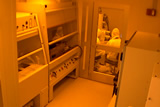- Home
- Research
- Education & Outreach
- Facilities
- Industry
Sankaran "Thai" Thayumanavan honored as 2011 AAAS Fellow
 Chemist Sankaran "Thai" Thayumanavan has been elected by his peers to be a Fellow of the American Association for the Advancement of Science in recognition of his contributions to supramolecular polymer chemistry, in particular the development of new self-assembling amphiphilic systems used in biological sensing. Thayumanavan received a certificate and AAAS rosette at the AAAS annual meeting in Washington, D.C. on Saturday, Feb. 19. Supramolecular chemistry is a way of organizing molecules using weaker interactions between molecules rather than a formal chemical bond. Such interactions are strengthened when polymers are used, because there are multiple copies of those weak interactions. These can be used to design molecules where they "just tend to organize themselves together" when in certain solutions or environments, the chemist explains. Such organization is akin to the situation when individuals arrive at a large, crowded party and begin to meet up with people they know in the crowd. They naturally group together, forming a subgroup or clump. As in the case of fans grouping to support a particular sports team, the self-assembling polymers also actively minimize interaction with the main group. Using this natural clumping or self-assembling quality of certain polymers, Thayumanavan and his UMass Amherst research group have found ways to design amphiphilic molecules, (from amphi "both" and philic "to like"), those that like two different things at once, such as water and oil, into interesting and useful structures. Interestingly, they've designed amphiphilic polymers that will self-assemble, but can also respond by disassembling in response to the presence of certain biologically important molecules such as proteins and peptides. This is helpful because the primary biological characteristic of many disease states is an imbalance or off-kilter concentration of specific proteins and peptides. One example of a future use is delivering drug cargo to specific diseases cell types. Thayumanavan's group is thus designing polymers that can self-assemble loosely around a drug "package," then in the presence of the target characteristics (marked by a specific peptide imbalance), they'll fall apart and release the treatment drug. While others have designed supramolecular polymers to respond to such markers as higher temperature or altered pH that are secondarily associated with disease states, Thayumanavan says his students and he took the more intellectually challenging route to design the biologically sensitive amphiphilic polymers. "These are the technological innovations we've contributed in this area for which we're being recognized." The non-profit AAAS was founded in 1848 "to advance science and serve society," and includes some 262 affiliated societies and academies of science. The tradition of AAAS Fellows began in 1874. Today, the AAAS is the world's largest general scientific society, and publisher of the journals, Science, Science Translational Medicine and Science Signaling Science. Source: UMass Amherst : In The Loop
Chemist Sankaran "Thai" Thayumanavan has been elected by his peers to be a Fellow of the American Association for the Advancement of Science in recognition of his contributions to supramolecular polymer chemistry, in particular the development of new self-assembling amphiphilic systems used in biological sensing. Thayumanavan received a certificate and AAAS rosette at the AAAS annual meeting in Washington, D.C. on Saturday, Feb. 19. Supramolecular chemistry is a way of organizing molecules using weaker interactions between molecules rather than a formal chemical bond. Such interactions are strengthened when polymers are used, because there are multiple copies of those weak interactions. These can be used to design molecules where they "just tend to organize themselves together" when in certain solutions or environments, the chemist explains. Such organization is akin to the situation when individuals arrive at a large, crowded party and begin to meet up with people they know in the crowd. They naturally group together, forming a subgroup or clump. As in the case of fans grouping to support a particular sports team, the self-assembling polymers also actively minimize interaction with the main group. Using this natural clumping or self-assembling quality of certain polymers, Thayumanavan and his UMass Amherst research group have found ways to design amphiphilic molecules, (from amphi "both" and philic "to like"), those that like two different things at once, such as water and oil, into interesting and useful structures. Interestingly, they've designed amphiphilic polymers that will self-assemble, but can also respond by disassembling in response to the presence of certain biologically important molecules such as proteins and peptides. This is helpful because the primary biological characteristic of many disease states is an imbalance or off-kilter concentration of specific proteins and peptides. One example of a future use is delivering drug cargo to specific diseases cell types. Thayumanavan's group is thus designing polymers that can self-assemble loosely around a drug "package," then in the presence of the target characteristics (marked by a specific peptide imbalance), they'll fall apart and release the treatment drug. While others have designed supramolecular polymers to respond to such markers as higher temperature or altered pH that are secondarily associated with disease states, Thayumanavan says his students and he took the more intellectually challenging route to design the biologically sensitive amphiphilic polymers. "These are the technological innovations we've contributed in this area for which we're being recognized." The non-profit AAAS was founded in 1848 "to advance science and serve society," and includes some 262 affiliated societies and academies of science. The tradition of AAAS Fellows began in 1874. Today, the AAAS is the world's largest general scientific society, and publisher of the journals, Science, Science Translational Medicine and Science Signaling Science. Source: UMass Amherst : In The Loop













